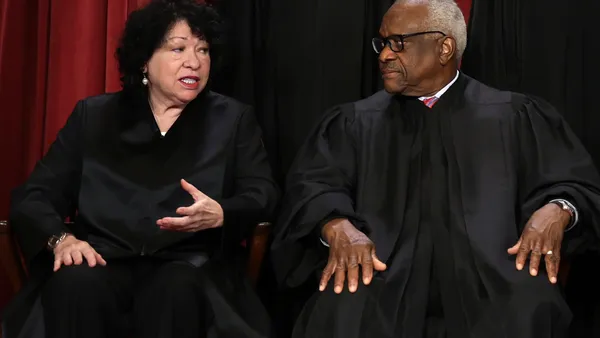Dive Brief:
- Vaccination mandates, incentives and related requirements are expected to proliferate significantly among U.S. employers entering the final quarter of 2021, according to a recent Willis Towers Watson survey.
- The firm's poll of 961 employers, conducted between Aug. 18 and Aug. 25, found that more than half could have one or more vaccination-related requirements in their workplaces by Q4. Examples included requiring a vaccine for workers to enter common areas or requiring vaccination for a subset of employees, among other options.
- Fifty-nine percent of respondents said they track workers' vaccination status, with 62% requiring proof of vaccination from employees and 36% asking them to self-report their status. Most employers were not considering an insurance discount for vaccinated employees nor implementing a premium surcharge on unvaccinated employees, Willis Towers Watson said.
Dive Insight:
Employers seeking to formally introduce vaccination policies got a recent boost from the Food and Drug Administration's decision to issue full approval of the Pfizer-BioNTech mRNA vaccine, according to attorneys who previously spoke to HR Dive. The White House followed up the agency's decision by stating that "now is the time" for organizations that had waited to issue a mandate to do so.
News headlines have already documented a couple of big names making such decisions. Starting Nov. 1, Delta Air Lines CEO Ed Bastian told employees that it would begin tacking on a $200 monthly surcharge for unvaccinated employees who are part of the company's health plan. Other employers such as Microsoft and Tyson Foods mandated vaccination for those entering physical offices and buildings.
Some officials have questioned, however, whether strategies such as a vaccination surcharge will ultimately help accomplish the goal of convincing unvaccinated employees to change course. Aside from the practical considerations involved, surcharges in particular may be subject to legal limits. Only 2% of respondents to the Willis Towers Watson survey said they were either offering a discount to vaccinated employees or imposing a surcharge on those who are not. An additional 18% said they were considering one or both approaches.
Law firm Littler Mendelson found in a recent report that employers in the manufacturing, retail and hospitality sectors were least likely to implement vaccine mandates, while those in healthcare were most likely to do so.
Regardless of the approach an employer takes with regard to COVID-19 vaccination, employers may need to carefully structure policies so as to spell out requirements, deadlines and the processes for requesting an accommodation. In addition to federal requirements, states and localities may have their own stipulations regarding vaccination policies. Montana, for example, passed a law prohibiting employers from denying a person employment opportunities, barring a person from employment or otherwise discriminating against a person on the basis of vaccination status.













